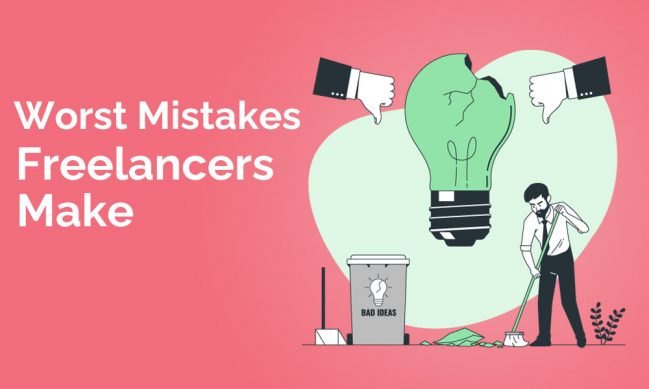Are you keep getting rejected by clients? Or are your clients keep asking for discounts? Or for more revisions?
Then see if you’re making these freelancing mistakes.
But, don’t worry. We all make mistakes when starting out. That’s how we learn to improve.
It was Albert Einstein once said that “a person who never made a mistake never tried anything new.” Of course, we can’t learn new things without taking a risk and sometimes we make mistakes in the process. But, if you make the same mistake twice, it will cost you.
Most freelancers make many mistakes when dealing with clients and often wonder why they aren’t getting enough jobs or why they have to chase after clients just to get their bills paid. Some even give up too easily after facing one failure after another.
I’ve also made many mistakes in my freelance career as well. But, I also learned to avoid the most by learning from the mistakes made by other freelancers. And you can do the same.
Here are some of the mistakes that you should try to avoid at all times to become an excellent freelancer.
1. Offering Discounts

Clients will often ask for discounts, especially when applying for jobs on freelance marketplaces. And it’s up to you to hold your ground during these discussions.
Of course, there are ways to make your client feel better and still charge the right amount as well.
But the worst part is how freelancers offer discounts without the client asking. This is what leads to bidding wars on freelancing sites like UpWork and Freelancer.com.
And it’s the worst possible way to throw your freelance career down the dumpster.
Because whenever you discount your services it sends a signal to the client that devalues your work. And it will hurt your reputation as a freelancer as well.
The key is to find the right clients that appreciate your talents.
2. Terrible Communication Skills

Learning how to talk to clients, write great emails, and craft killer project proposals are all important elements that will lead you to become a better freelancer.
Clients are more experienced in dealing with freelancers. And they can spot an amateur from the first message they get.
The way you address the client in an email or the way you word your messages can send strong signals about your work ethic and experience.
You don’t have to pass courses or have English literature degrees, just knowing how to write a great email or how to hold a pleasant conversation with a client is more than enough.
You can start by reading this guide on how to write emails and talk to clients.
3. Accepting More Than You Can Handle

A few years back, I took on a big project to deliver 20 1500-word articles in 20 days. I was already working on two other projects at the time, but I was too greedy to say no to this opportunity. At the time, it took two days for me to process an article, and this time I wanted to challenge myself to see if I could do more. And I was so terribly wrong.
I managed to deliver the project in time and the client was happy with the results. But, I had to work all day to manage all the projects and by the end of the month, I was exhausted to carry on my work. Worst of all, I wasn’t able to deliver my usual high-quality work at that time.
He never came back to order more. Probably because of the poor quality of my work. I lost a valuable client.
From that day on, I decided not to accept more than I could handle no matter how good it sounds.
The point is that it’s important you pace yourself when accepting new jobs. I know you have to pay your bills and rent. But try not to be too greedy and think about your career in the long term.
4. Working For Free

I know that exciting feeling you get when a client replies to your proposal saying that they’ve decided to give you the project. It’s a great feeling, isn’t it? This month’s rent is covered.
But, don’t get too excited because those clients might rip you off.
Not all clients are honest and trustworthy, some are looking to manipulate you into getting what they want and never pay you for it. Asking for free sample work is a common method some clients use to get their projects done by a series of freelancers without paying them for their work.
Another method is scrapping the project at the last minute after you send your work for a final review. Most clients will simply ignore you after delivering the work. What are you going to do, sue them?
You must prepare yourself to face these situations. First of all, never do free samples and never work for free. And try to get them to sign your proposal if you can.
If a client wants to see a part of their project done by you, calculate the price you’d charge for that part and ask them to pay for your work upfront.
Always ask your clients to deposit a certain percentage of your full payment before starting work. If you’re using a freelancing platform, have the client break down the project into small goals so that you get paid each time you deliver a piece of the project.
5. Not Knowing How to Price Your Services

Figuring out the perfect price for your service can be difficult when you accept projects of different sizes. But, if you don’t figure out a suitable method to charge for projects early on in your career, it will hurt your credibility in the long run and you won’t be able to raise your prices.
According to a study done by Contently, 38.6% of freelancers have only made $10,000 a year which is even less than $900 a month. Only 19% have been able to make above $50,000.
Charging low rates is a mistake that almost all freelancers make on sites like Upwork and Freelance.com. These sites are made to lower your standards and force you to work cheaper. But, if you’re confident about your capabilities and experience, you should fight for your place and charge your clients reasonably.
6. Assuming You Know Everything

Technology is evolving faster than in a blink of an eye. And you need to evolve with it to be more competitive and a more relevant freelancer in your industry.
You may be an expert copywriter or an expert SEO analyst, but if you think you know everything you will avoid trying to learn new skills. Or stay up-to-date with the latest news in the field. Eventually, you’ll come to a dead end or someone else with much higher skills and lower rates will come to replace you.
There’s nothing wrong with learning a couple of new skills to improve your work and skills. Subscribe to all the top blogs in your industry and stay updated with the latest trends.
I use Skillshare to learn a new skill every month. It’s a solid investment that keeps me on top of my freelance career. If you can’t afford premium courses, use YouTube and other free sites like eDX.org.
7. No “Rainy Day” Fund

When you start making more money than you’ve expected, it’s easy for you to get a little carried away and spend over the usual budget. What’s the point of making money if you can’t spend on the things you love, right?
Sure, you’re free to do whatever you want with your money. Just remember to save a small amount of your earnings in your bank every month, just in case. Think of it as your retirement plan or the Rainy Day Fund.
Freelancing has ups and downs. One month you’ll earn $5,000 and $100 in the next. You can never be sure of what to expect in this field. So, make sure you have a rainy day fund to cover your costs during those harsh times.
This is the one mistake that forces freelancers to quit their careers and go back to day jobs because they don’t plan ahead. Don’t make the same mistake.
In Conclusion
I always refrain from calling myself an expert because even though I have gathered plenty of experience over the years, I know that I still have a lot to learn. Socrates was right, “the only true wisdom is in knowing you know nothing.”
So keep learning, find ways to challenge yourself, and strive to be a better freelancer!


Thank You very much 🙂